The Universal Periodic Review (UPR) is a specific instrument for monitoring human rights situations in all United Nations (UN) member states. It provides an opportunity for all countries to share the activities undertaken to improve human rights and overcome challenges in this area. The ultimate goal of the UPR is to improve the human rights situation in each country, with significant consequences for people worldwide. The UPR is designed to encourage, support, and expand the promotion and protection of human rights in practice.
The UPR is implemented by the Working Group on the UPR, which consists of members of the Human Rights Council, and each UN member state can participate in the discussion with the countries under review. The Working Group, the state involved, and the Office of the UN High Commissioner for Human Rights (OHCHR) prepare a report, which is a summary of the discussion and consists of questions, comments, and recommendations made by states to the country under consideration, as well as the responses from that state. Subsequently, it has the primary responsibility to implement the recommendations contained in the final report. According to the UPR, all countries bear responsibility for the progress or failure in implementing these recommendations. At the subsequent review, each country is expected to furnish information regarding the actions taken to implement the recommendations.
The human rights situation in UN member states is reviewed every five years. There have been three UPR cycles so far, and the fourth one is currently underway. This analytical report on fundamental rights contains the key findings of seven local civil society organisations—grantees of the “Human Rights in Practice” small grants scheme implemented under the “Joint Action for Human Rights” project. This project aims to advance the promotion and protection of human rights in North Macedonia by supporting parliamentary and CSO engagement in the area. It is implemented by the European Policy Institute, with the financial support of the European Union.

